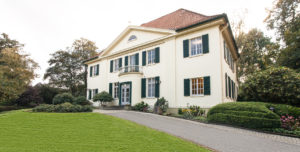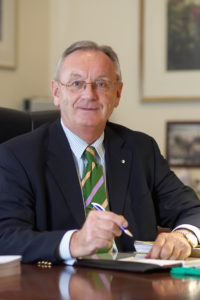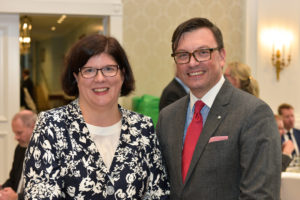On October 1, Otto Stadtlander GmbH, Bremen, celebrated its company centenary. Almost a hundred guests were welcomed to the celebrations, also including many former employees. A good reason to review the company’s history once again.
October 1919 – almost a year since the defeat in the Great War. After the imperial era, the German Republic, founded in 1918, had just received its democratic constitution. On October 1, 1919, businessman Otto Stadtlander founded his export company in Bremen, supplying consumer goods of various kinds to North Africa and South America.

100 years later, Otto Stadtlander GmbH is the largest remaining German cotton trader. The company has a worldwide network of loyal customers from the textile industry as well as reliable raw material suppliers. At the same time, it can look back on a varied history. Over the course of time, not only the countries being delivered to and the customers have changed, but also the products being traded. Reliability, flexibility and dynamism, as well as openness to innovation, diversification and specialisation have proved to be the strengths used in the recipe for success in the company history of the Otto Stadtlander Group.
The early years
At the beginning of the 1930s, Otto Stadtlander’s business initially revolved around the coffee trade under the trademark “OSTA KAFFEE”. It was only when Max C. Schneider joined the company from Zurich in 1935 that the foundation was laid for a rapidly growing cotton business. Stadtlander took care of cotton contracts with German spinning mills for his father’s company, Schneider & Co. During the Second World War, the cotton business had come to a standstill. However, it was revived immediately afterwards by the liberalisation of raw material imports. The focus was initially on the trade in cotton of African origin, e.g. from Sudan or East Africa. In the 1960s, the core business was the successful completion of large government business with Egyptian cotton. In the 1970s, trade in cotton from the Central Asian region gained considerable importance, most notably from the former Soviet Union.

In October 1984, Otto Stadtlander GmbH moved into its business premises in the former French consulate building on Marcusallee, which is still the seat of the company to this day. In 1964, Rainer Hammer joined the company. Now Managing Partner, he took over the management of the company in 1987. With prudence and an eye for market developments, he steered the company through difficult waters, strengthened financially by additional partners and thanks to his dedicated employees.
Manoeuvring through the crisis
At the beginning of the 1990s, the creeping crisis throughout Europe’s textile industry posed a major challenge to the industry. Closures and the increasing shift of textile production to more cost-effective locations, as well as increasing competition from synthetic fibres affected the cotton business of commodity traders and processors. The number of spinning and weaving mills in the German-speaking region declined rapidly. In this structurally changing environment, Otto Stadtlander was able to hold its ground through clever corporate management. On the one hand, the trade in long and extra-long staple varieties played a role alongside the trade in conventional cotton. This was crucially expanded with the acquisition of the exclusive representation of the Israel Cotton Board.
On the other hand, the company opened up new markets in Asia. With premises in Shanghai, business with the world’s largest cotton producer and processor, China, has been given special significance. Internationally networked, the company now has cooperative offices in Sao Paulo, Riga and Shanghai alongside its headquarters in Bremen. Medium staple cotton is available from the African continent, Central Asia, North and South America, Europe, as well as India, Pakistan and Turkey. The range of long and extra-long qualities comes from Egypt, India, Israel, North America, South America and Europe. The product range also includes certified cotton such as organic, BCI or the Cotton made in Africa standards.
Expanding Business Fields
Although the company’s heart beats traditionally for cotton, it entered the synthetic fibre trade many years ago, triggered by a large number of enquiries from existing cotton customers. The successful subsidiaries Multifiber in Bremen, Cetex Rheinfaser in Ganderkesee and Bunzl Raccolta in Biella, Northern Italy, distribute service-oriented products such as viscose, polyester staple, and modacrylic or aramid fibres for different uses in international markets.

An important guarantor of the company’s success are its employees. The company has always trained and promoted young talent. The long-standing and industry-experienced employees have a high level of expertise and maintain intensive customer contacts. Managing Partner Rainer Hammer is supported by Managing Directors Henning Hammer and Stephanie Silber. Henning Hammer is responsible for the Asian business at the Shanghai base, while Stephanie Silber controls the finances. Both represent the new generation of dedicated cotton traders who are leading Otto Stadtlander GmbH into the future.
The Bremen Cotton Exchange thanks the management and the employees of Otto Stadtlander for their invaluable, continuous support of the work of the Bremen Cotton Exchange.
Otto Stadtlander and the Bremen Cotton Exchange
Otto Stadtlander GmbH has been a valued member of the Bremen Cotton Exchange since 1979. Rainer Hammer was on the Board from 1996 to 2018. Henning Hammer has been a member of the Board since 2013, was a member of the Executive Committee from 2014 to 2019 and served as President of the Bremen Cotton Exchange from 2016-2018. Since 2019, Stephanie Silber has been the first female member of the Executive Committee of the Bremen Cotton Exchange.
copyright photos: Otto Stadtlander GmbH

